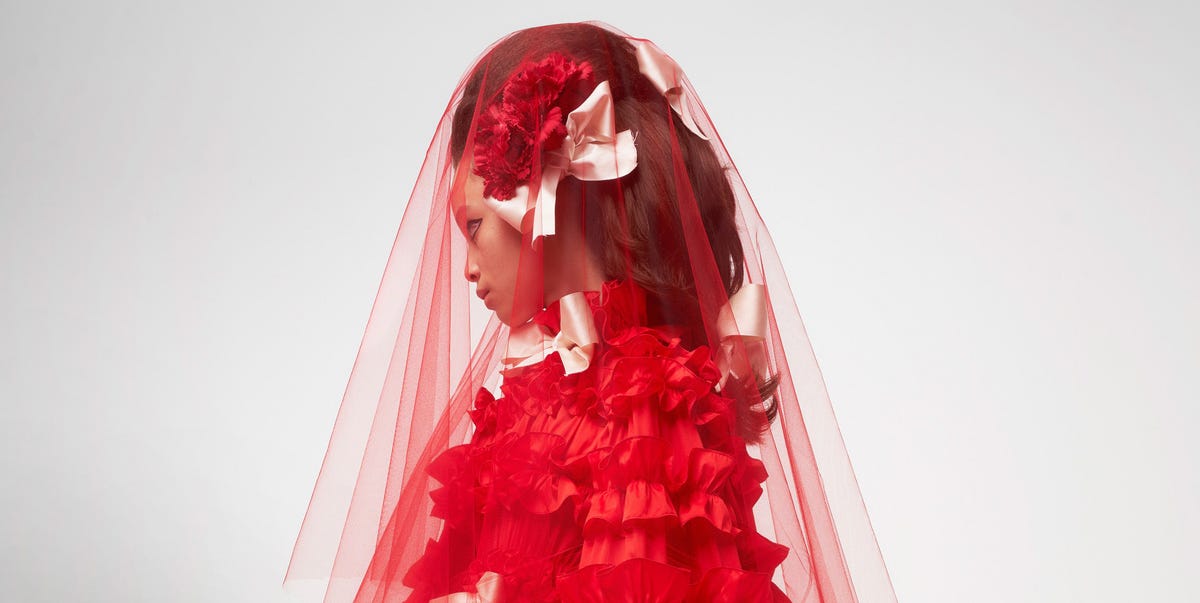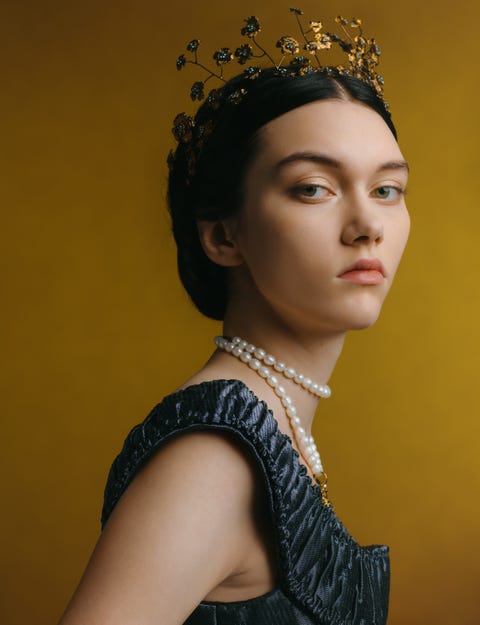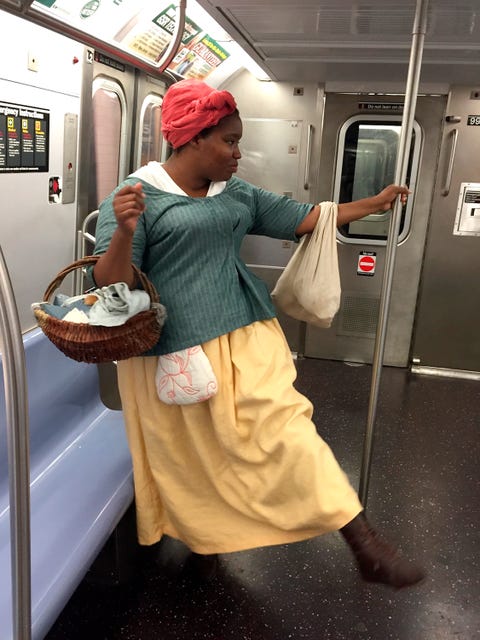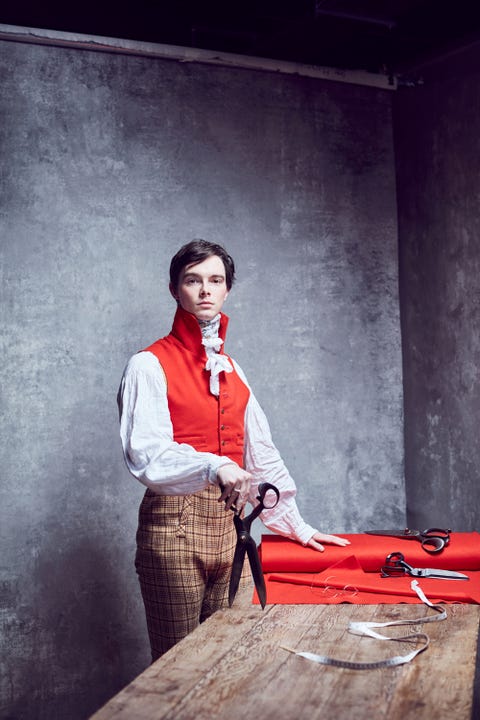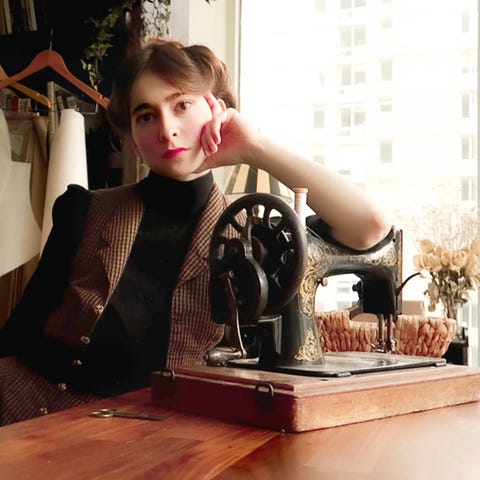It’s not historically accurate; it’s very designed,” explained dress historian Bernadette Banner to her more than one million YouTube subscribers in a year-end video ranking 2020’s spate of costume dramas on their accuracy. Still, anachronisms like Queen Charlotte’s “random mid-eighteenth-century gown” in a sea of late-eighteenth century Empire numbers certainly didn’t stop some 82 million viewers from tuning in to the Regency-era antics of the show she was discussing, Netflix’s Bridgerton. You’d be hard-pressed to find a better deterrent to a sedentary life in sweats than a fantastically costumed romantic series. And, fortunately for our collective sartorial pleasure, fashion has fallen in line.
It started at Dior, with Maria Grazia Chiuri hinting at what her spring 2021 couture collection would hold with a chiaroscuro-heavy spring ready-to-wear campaign lensed by Elina Kechicheva that channeled Caravaggio. For couture, Chiuri blurred a timeline that spanned Renaissance to Regency and had critics drawing comparisons to the Netflix hit series. But, in fact, the collection was actually inspired by a deck of tarot cards, known as the Visconti-Sforza tarot, that Bonifacio Bembo illuminated for the Duke of Milan in the fifteenth century. Dior himself was a fan of the divinatory arts, and Chiuri paid tribute by enlisting artist Pietro Ruffo to create tarot-themed illustrations, which served as a foundation for bas-relief openwork bodices.
Giambattista Valli has also never been one to shy away from dramatic flourishes. For his couture collection, there were the countless yards of tulle and taffeta we’ve come to expect, but the real showstoppers were the skyscraping wigs and Carnevale-worthy masks, festooned with bows and flowers. “Haute couture is about gestures of grandeur. Even more so this season, when we could no longer hold physical shows, it was important to amplify the volume into the extreme,” Valli says. The ’60s models Benedetta Barzini and Marisa Berenson were beauty inspirations, but the hair was undoubtedly modern-day Marie Antoinette. “We wanted something a bit extravagant,” says hairstylist Odile Gilbert, who predicts an uptick in eccentric looks post-pandemic.
Couture seems a fitting medium for such a display, given the parallels between that rarefied world and what we think of as historical dress. As Banner explains, our view is inherently skewed due to the clothing that’s survived: elaborate, painstakingly made garments in fine fabrics, either as physical artifacts or in portraiture that largely depicts the nobility. Plainer, everyday garments worn by ordinary citizens would have been worn to shreds out of necessity. But the reexamination of all things costume drama is far from limited to the runway. Banner, who splits her time between London and her native New York, is one of several prominent historical dress influencers who predate the buzzy series, part of a movement that has been simmering for the last few years that takes pride in intricate details, scholarly research, and challenging our received version of history, like Bridgerton itself.
Few are as dedicated to challenging longstanding biases as Cheyney McKnight, founder of Not Your Momma’s History and the coordinator of living history at the New-York Historical Society. A native of Atlanta with roots in New York, McKnight started her examination of the South through a critical lens as a child. “We would visit plantations for school trips and be told these fantastical stories, and I can remember [thinking], ‘This is BS,’ ” McKnight says. “I knew the purpose of a plantation was not to be a home but primarily a forced-labor camp.”
In 2013, McKnight found her calling when she began participating in historical reenactments, and was fascinated to learn the perceptions people had about clothing in the eighteenth and nineteenth centuries. “I was told early on that Black people just wore cheaper versions of what white people were wearing,” says McKnight, whose doubt regarding that notion led her to do research that proved it patently false. “I found that Black folks in North America still had a very distinctive West African style sense that is present to this day. I’m fascinated by what enslaved people were thinking about the future, what their hopes and dreams were, how that came out in clothing, and how I can pay homage.” Initially, McKnight received pushback within the historical community for using her work as a reenactor to address current political issues, not that it’s deterred her. Last November, she dressed as an enslaved mother and stood outside the U.S. Capitol to remind people that children at the border were being detained and separated from their parents, calling to mind the challenges emancipated individuals faced after the Civil War in trying to locate their relatives.
Brighton, England–based Zack Pinsent lives and breathes the Regency period. Having burned his jeans at age 14, the self-taught tailor fashions all his own clothing, which he documents for his nearly 370,000 Instagram followers. Though the effect might seem elaborate to some, Pinsent insists his actual wardrobe, like his early-nineteenth-century inspirations, is quite curated. Many of his ensembles are not too far a cry from, say, the shimmering velvet suit worn by Cara Delevingne, looking every bit the dandy, at Fendi’s spring 2021 couture show, or a menswear-inspired evening gown by Armani Privé that featured a face-framing collar. And it’s hard to imagine calling his Wedgwood blue and white linen summer Hussar uniform, which required hand-stitching over 150 meters of passementerie and took over a year to complete, anything other than couture.
“It’s wonderful to be able to breathe life into history,” Pinsent says. “We have our notions of what [it] was and how it’s presented, but when you read diaries or look at clothing samples, you realize that people have always been people, with the same desires and foibles as we have now.”
The fact that most contemporary garments not made at the couture level will never become the vintage of tomorrow—they simply aren’t made to last—presents a bit of a challenge for future historians and designers that Banner finds concerning. So she’s doing her part to combat disposable fashion. Her YouTube tutorial for a modern adaptation of an Edwardian walking skirt has proven to be one of her biggest hits to date, spurring several viewers to pick up needle and thread for the first time. “Suddenly, I was receiving comments from people who were inspired to hem their own jeans,” Banner says.
Whether educational or purely escapist, historical drama and haute couture are the antithesis of the rapid clip and hyperconsumerist nature of modern society. Slowly crafting something by hand is, in Banner’s view, “pouring the humanity into a garment.” McKnight has been mixing things up lately, too, experimenting with Afrofuturist fashion “as a way of honoring my ancestors and reaching for the future of my people,” and even dyeing her own fabrics. Pinsent sums it up quite succinctly: “I’ve always loved dressing up. I mean, what child doesn’t? Why do we stop?”
This article appears in the June/July 2021 issue of ELLE.
This content is created and maintained by a third party, and imported onto this page to help users provide their email addresses. You may be able to find more information about this and similar content at piano.io
